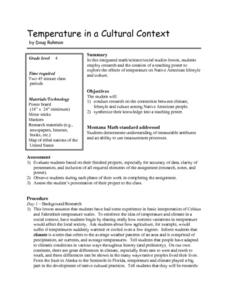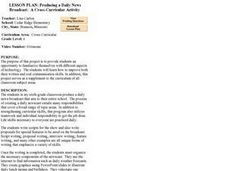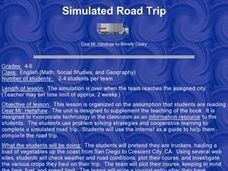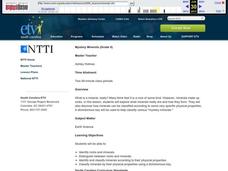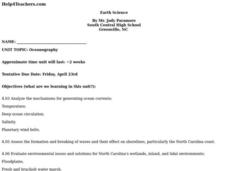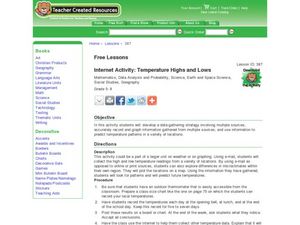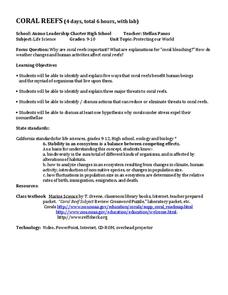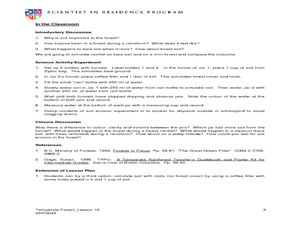Curated OER
Natural Features of Our Community
Second graders read about and discuss natural features of communities. They listen to a guest speaker, such as a park ranger to expand their knowledge of natural features. They go on a field trip, if possible, to a local zoo or...
Curated OER
Science Videos
Students plan, practice, and act in a 2-3 minute videotaped production about a specific topic. Students from a local high school give presentations pertaining to seasons, earth rotation, and moon phases. Students analyze the...
Curated OER
Temperature in a Cultural Context
Fourth graders investigate the effects of temperature on Native American lifestyle and culture. In small groups they conduct research on cultural practices showing a connection to the climate and create a poster displaying their...
Curated OER
Falling Into Leaves
Students investigate why leaves change color. In this chlorophyll lesson, students examine how chlorophyll effects the color changes in leaves. Students take pictures of changing leaves, and create a class quilt showing the changes of...
Curated OER
Barrier Islands
Third graders explore how barrier islands work. In this erosion lesson, 3rd graders create barrier islands in stream tables and simulate wave action to see how it affects their island.
Curated OER
Producing a Daily News Broadcast: A Cross-Curricular Activity
Sixth graders create a daily newscast which they broadcast to the whole school. They write the scripts for the broadcast, after reviewing interviews, feature writing, and proposals. They organize the newscast for presentation and edit...
Curated OER
Simulated Road Trip
Students read the book, DEAR MR. HENSHAW. They implement problem solving strategies and cooperative learning to complete a simulated road trip. Students will use the Internet as a guide to help them complete the road trip.
Curated OER
Mystery Minerals
Students minerals and how they form. They investigate the classification of minerals according to physical properties. Students watch a video about mineral characteristics. In groups, students participate in hands-on activities and...
Curated OER
Earth Science
Young scholars analyze the mechanisms for generating ocean currents, temperature, and deep ocean circulation. They are able to assess the formation and breaking of waves and their effect on shorelines, particularly the North Carolina...
Curated OER
Tall Tales and Urban Legends
Students identify and interpret what tall tales, urban legends, and cyberlore are and to find them in their own lives. They practice telling and listening to these types of tales and explore why people tell them. Students also identify...
Curated OER
Rainbow Spinner
In this rainbow spinner worksheet, students participate in making a rainbow spinner in order to investigate the splitting and mixing of light. Students study the theory of persistence of vision.
Curated OER
Temperature High and Lows
Learners gather high and low temperature readings through email. For this temperature graphing lesson, students use a spreadsheet to input data for a graph. learners interpret the graphs to compare and contrast the data from different...
Curated OER
Used To or Be/Get Used to Exercise
In this correct grammar usage learning exercise, students read incomplete sentences and complete them using used to plus infinitive, be used to plus object or verb plus -ing, or get used to pus object or verb plus -ing. Students circle...
Curated OER
I love penguins!
Students listen to stories and view video about penguins. In this penguins lesson, students research penguins in groups and present a report using their choice of technology or artwork presentation.
Curated OER
Guetemala's Changing Forest
Eighth graders compare their local ecological zone to the tropical rainforest. In this natural ecology lesson, 8th graders complete an activity about the differences in ecological zones. They compare their biome to the Guatemalan...
Curated OER
How Probable is It?
Students explore probability. In this probability lesson, students look at videos and websites where they discover probability facts that can be used in situations. They determine the probability of different events.
Curated OER
The World's Forests
Students examine the world's forests. In this forest lesson, students gain knowledge about the sustainability of forests. Students break into groups and brainstorm why forests are so important to our world. Students discuss what can be...
Curated OER
Coral Reefs
Young scholars research coral reefs and identify their benefits to humans, threats to the reef, how to reduce and eliminate threats, and more. In this coral reef lesson plan, students research the reefs, and take a field trip to an...
Curated OER
Water Cycle Stories
Students create water cycle stories. In this water cycle instructional activity, students review the parts of the water cycle. They create a story that describes the journey of a water molecule as it makes its way through the cycle and...
Curated OER
State Facts A Right Angle Puzzle
In this geometry instructional activity, students create words making a right angles each time. There are 50 questions to be solved with an answer key.
Curated OER
Paying With Their Health
Students consider the plight of immigrant workers. In this undocumented immigrant lesson, students compare the worker of the Industrialization era to the undocumented immigrant workers of today. Students read and discuss literature about...
Curated OER
A Day in the Life of a San Francisco Native Animal
Students write from an animal's perspective. In this writing lesson students explore the landscape of San Francisco prior to the arrival of the explorers. Students research animals indigenous to the area.
Curated OER
Scatter Plots
Seventh graders investigate how to make and set up a scatter plot. In this statistics lesson, 7th graders collect data and plot it. They analyze their data and discuss their results.
Curated OER
Forest as a Filter
Students experiment using soil and water. In this forest as a filter lesson, students identify the role of forest cover, vegetation, and foliage impacts erosion and evaporation. Students conduct a simple experiment, form a hypothesis,...




